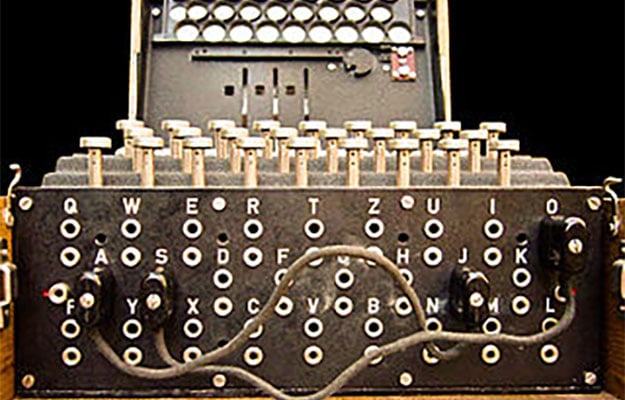WWII-Era German Enigma Encryption Finds New Life In Fraud Proof Credit Cards
There has been a big debate since the end of World War II regarding whether human beings should use the research and technology developed by the Nazis. Do we get rid of something that is useful or life-saving if someone bad created it? The United Kingdom is taking a chance -- WWII Nazi encryption technology will likely be used to create more secure credit cards.

During WWII, the Germans used enigma machines to generate new cyphers or codes that could be used to encrypt and decrypt military messages. The Allied forces were greatly irritated by these machines. The cyphers were generated at such a rapid pace that as soon as the Allied forces had decoded one message, a new cypher was already in use. British mathematician Alan Turing, played by Benedict Cumberbatch in the 2014 film The Imitation Game, decoded the enigma machine in the middle of the war.
Britain’s new credit and debit cards would rely upon technology based upon the enigma machines. Inventors George French and David Taylor have filed a patent and are in talks with banking giant Barclays. Barclay customers would potentially push a PIN into a keypad attached to the card. This would generate a variety of codes that would light up next to the card's signature strip and would only exist for a specific time interval. These credit cards could also potentially include contact-less payment chips, WiFi, and/or Bluetooth.

French and Taylor hope that their new card system will cut down on credit card fraud, with online criminals often using “distributed guessing attacks” in order to figure out a card’s three-digit CVV in a matter of seconds. Criminals throughout the world were able to steal roughly $16 billion USD in 2015 and many estimate that this number will reach $35 billion by 2020.
It is currently unknown when these new credit and debit cards will be available.

A plugboard positioned in front of an "Enigma" machine.
During WWII, the Germans used enigma machines to generate new cyphers or codes that could be used to encrypt and decrypt military messages. The Allied forces were greatly irritated by these machines. The cyphers were generated at such a rapid pace that as soon as the Allied forces had decoded one message, a new cypher was already in use. British mathematician Alan Turing, played by Benedict Cumberbatch in the 2014 film The Imitation Game, decoded the enigma machine in the middle of the war.
Britain’s new credit and debit cards would rely upon technology based upon the enigma machines. Inventors George French and David Taylor have filed a patent and are in talks with banking giant Barclays. Barclay customers would potentially push a PIN into a keypad attached to the card. This would generate a variety of codes that would light up next to the card's signature strip and would only exist for a specific time interval. These credit cards could also potentially include contact-less payment chips, WiFi, and/or Bluetooth.

Alan Turing at the age of sixteen.
French and Taylor hope that their new card system will cut down on credit card fraud, with online criminals often using “distributed guessing attacks” in order to figure out a card’s three-digit CVV in a matter of seconds. Criminals throughout the world were able to steal roughly $16 billion USD in 2015 and many estimate that this number will reach $35 billion by 2020.
It is currently unknown when these new credit and debit cards will be available.

